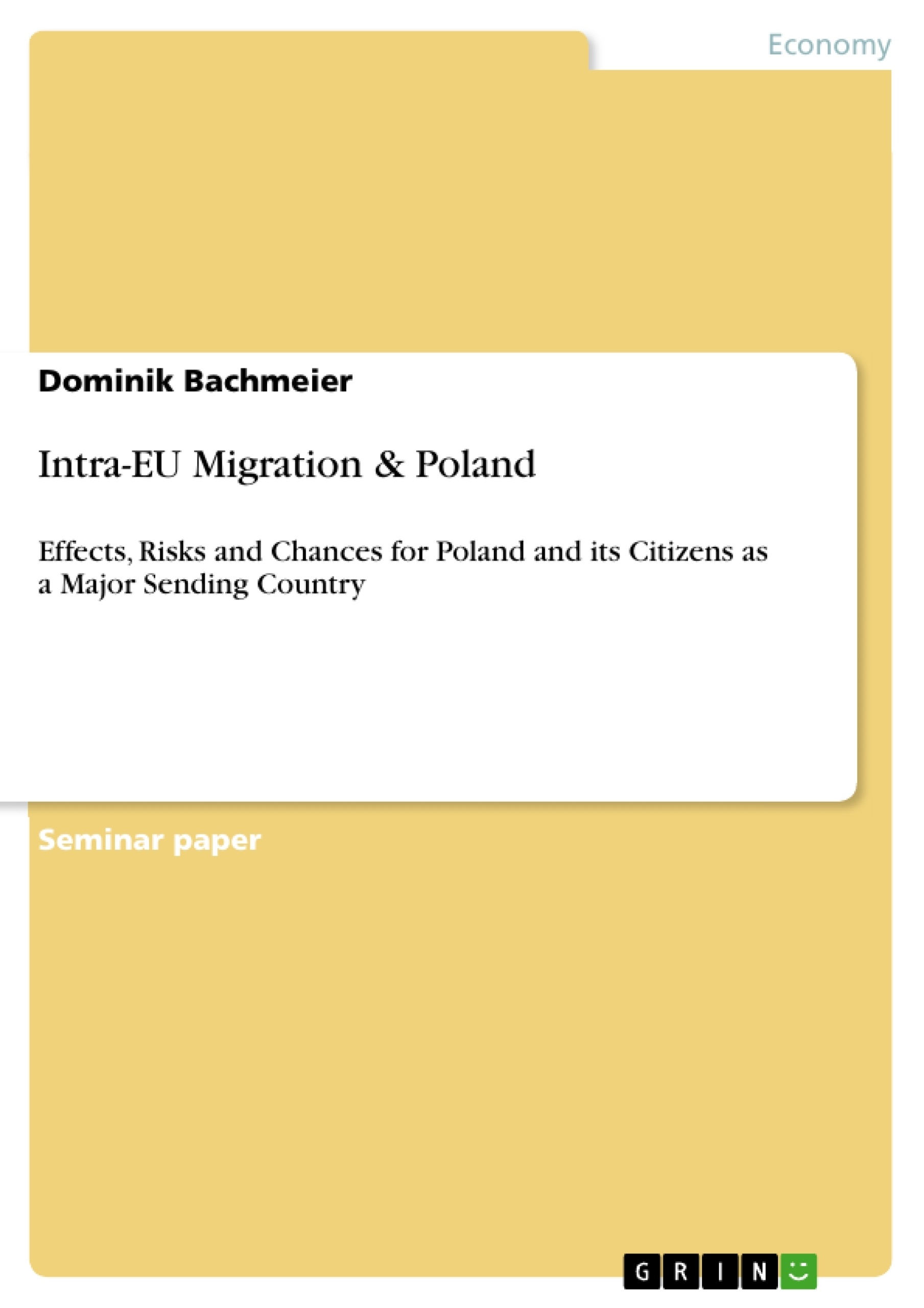Though, there has been migration since the beginning of human life and migration within Europe is nothing new, the quantitative degree and even the reasons for migration within Europe have changed. One reason for that is the right of free movement within the EU, which was used by a total of 11.8 million people in 2016. However, the public debate on migration in Europe is primarily focusing on international migration from non-member states. In recent years this was dominated by the topic of the refugee crisis, which led to less attention for intra-EU migration. Nevertheless, intra-EU migration is a main cause for the high number of new immigrants, at least for Germany and the UK. In Germany, it has increased noticeable in recent years, while migration from non-EU countries has decreased. One of the most represented foreign communities in receiving countries are often Poles. Back in 2017 for example, Germany had more immigrants coming from Poland than ever before. The enlargement of the EU in 2004 and the connected freedom to work in other EU countries was one of the most important stimuli for emigration in Poland´s latest history. Even before the EU, there were high numbers of emigrants leaving. But the accession greatly enhanced migration, leading Poland to be one of the largest emigration countries within the EU. Even though the peak of emigration was reached in 2007 with about 1.8 million migrants, there are still many Poles going abroad to live and work there. In 2015 alone 123 thousand people have left Poland. Nevertheless, the Polish economy is one of the fastest growing among EU countries and its unemployment is reducing, too. In fact, Poland was the only country in the EU, which has avoided recession the years after the financial crisis in 2009.
These issues lead to the question of the effects of mass intra-EU migration for Poland´s economy as a major sending country and the impacts on Poles, both, those staying in Poland and those who are living abroad. Also, it is interesting to know why so many Poles have left or want to leave Poland. To answer this question, this seminar paper will in the first part give the required fundamentals of intra-EU migration and following that, will assess the effects, risks and chances for the sending country Poland and its citi-zens. After giving an insight into government activities concerning Poles abroad, the seminar paper gives a conclusion on the impact of intra-EU migration for Poland and its citizens.
Inhaltsverzeichnis (Table of Contents)
- Introduction
- Fundamentals of Intra-EU Migration
- Intra-EU Migration and its Legal Basis
- History of Intra-EU Migration
- The Influences of Intra-EU Migration on the Economy of Poland
- History of Intra-EU Migration for Poland
- Data of Intra-EU Migration for Poland
- Drivers and Barriers for Migration from Poland
- Costs and Risks for the Economy of Poland
- Benefits and Chances for the Economy of Poland
- Government Activities Concerning Poles Abroad
- Conclusion
Zielsetzung und Themenschwerpunkte (Objectives and Key Themes)
This seminar paper aims to explore the effects of intra-EU migration on the economy of Poland as a major sending country and its citizens. The paper examines the impact of migration on both those staying in Poland and those living abroad, addressing the motivations behind such migration and analyzing the associated costs, benefits, and risks.
- The legal basis and historical context of intra-EU migration.
- The influence of intra-EU migration on Poland's economy and the factors driving emigration.
- The economic impacts of intra-EU migration on Poland, including both costs and benefits.
- The role of government policies and initiatives in addressing the issue of Poles living abroad.
Zusammenfassung der Kapitel (Chapter Summaries)
- Introduction: This chapter introduces the topic of intra-EU migration, highlighting its significance in Europe and the growing number of Polish migrants, particularly in Germany. It emphasizes the impact of EU enlargement on Poland's emigration patterns.
- Fundamentals of Intra-EU Migration: This chapter explores the legal basis of intra-EU migration, focusing on the right of free movement and its implications for workers and employers. It also delves into the historical evolution of intra-EU migration within the European integration project.
- The Influences of Intra-EU Migration on the Economy of Poland: This chapter examines the historical context of Polish emigration, analyzes data on migration patterns, and identifies the driving forces behind emigration from Poland. It further explores the costs, risks, and potential benefits of intra-EU migration for Poland's economy.
Schlüsselwörter (Keywords)
The core keywords and focus topics of this paper include intra-EU migration, Polish emigration, the European single market, free movement of persons, economic effects, costs and benefits, government policies, and the Polish economy.
Frequently Asked Questions
How did the 2004 EU enlargement affect migration from Poland?
The enlargement granted Poles the right of free movement to work in other EU countries, leading to a massive increase in emigration, peaking in 2007 with 1.8 million migrants.
What are the main drivers for Poles leaving their country?
Key drivers include higher wages abroad, better career opportunities in countries like Germany and the UK, and the legal ease of movement within the EU.
What are the risks of mass emigration for Poland's economy?
Risks include "brain drain," labor shortages in specific sectors, and the long-term demographic challenge of a shrinking working-age population.
Did migration help Poland avoid the 2009 recession?
While Poland was the only EU country to avoid recession after 2009, this was due to a fast-growing economy; migration provided both relief (remittances) and challenges (loss of workers).
What is the legal basis for intra-EU migration?
The legal basis is the "Right of Free Movement" within the European Union, which allows citizens of member states to live and work in any other member state without a work permit.
- Quote paper
- Dominik Bachmeier (Author), 2018, Intra-EU Migration & Poland, Munich, GRIN Verlag, https://www.grin.com/document/442092



